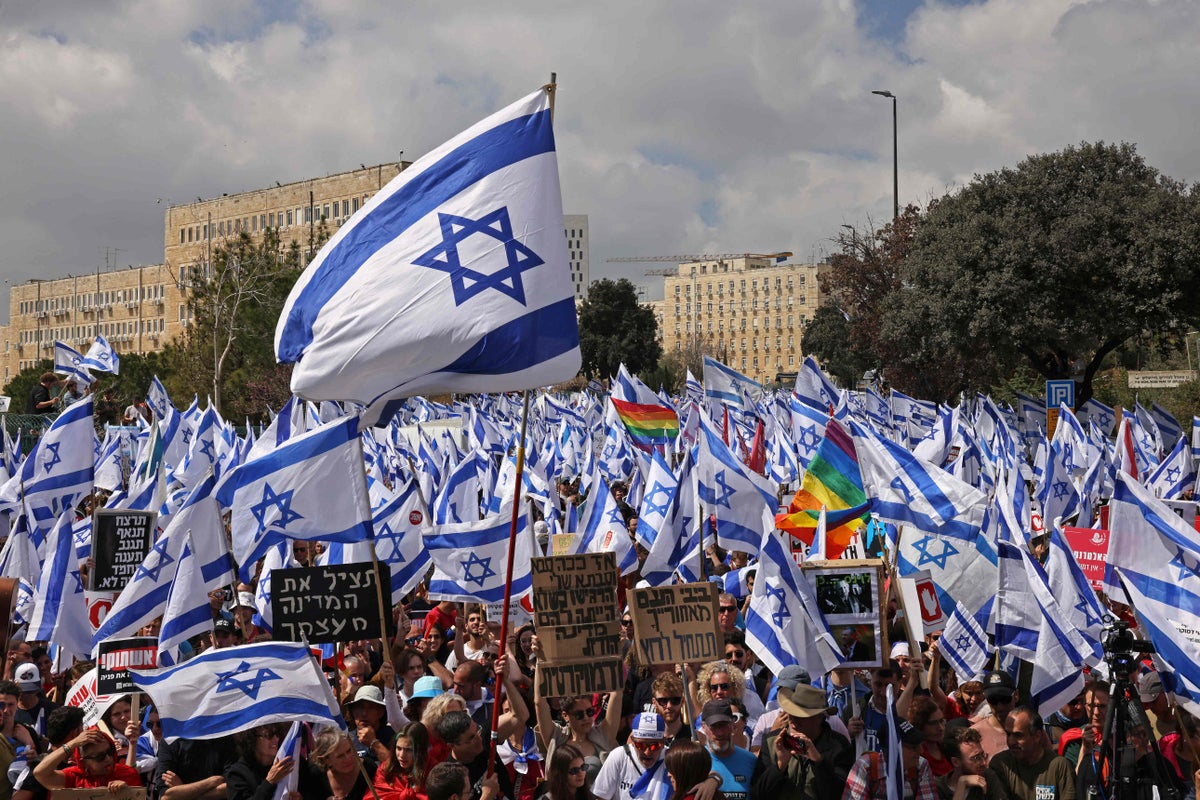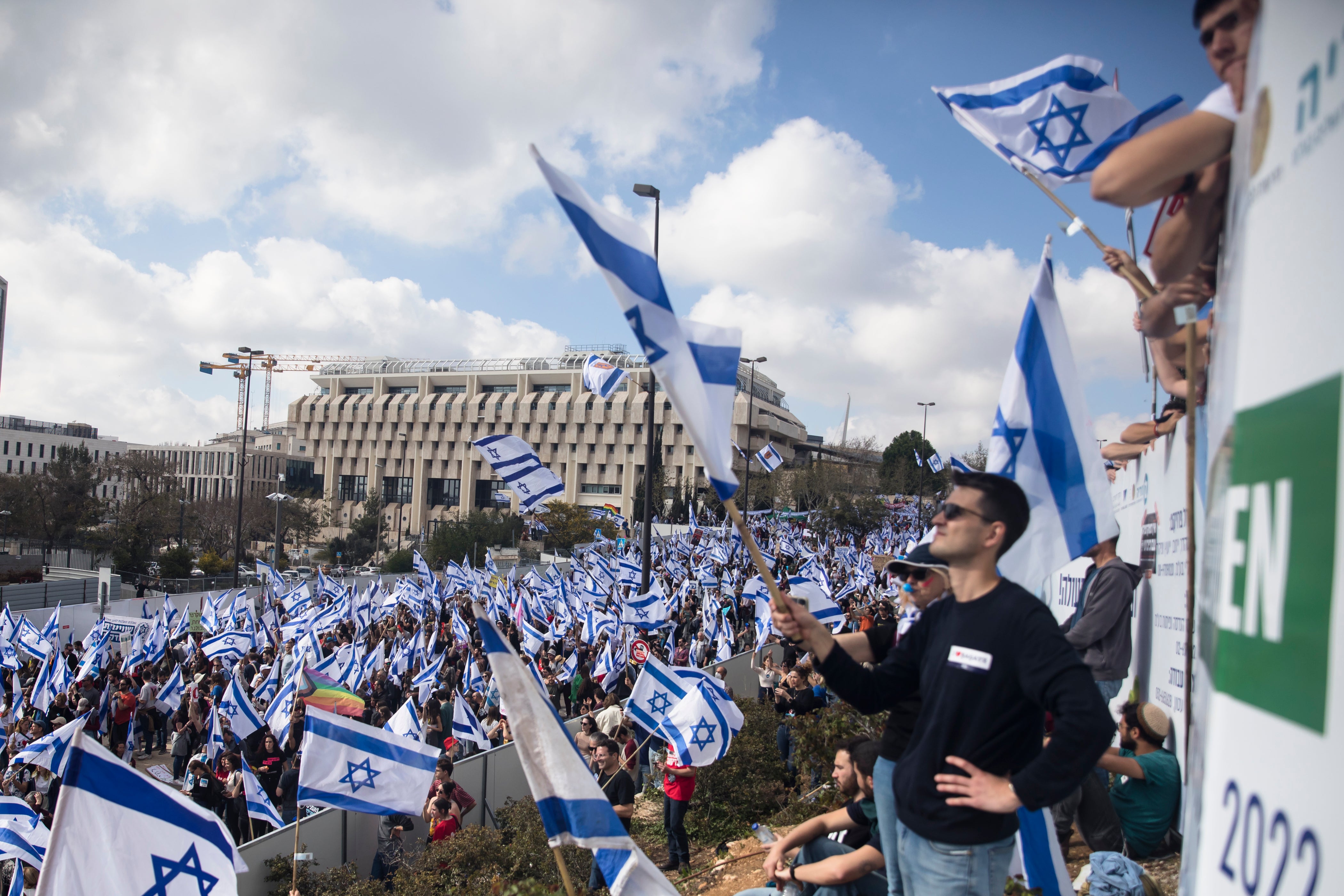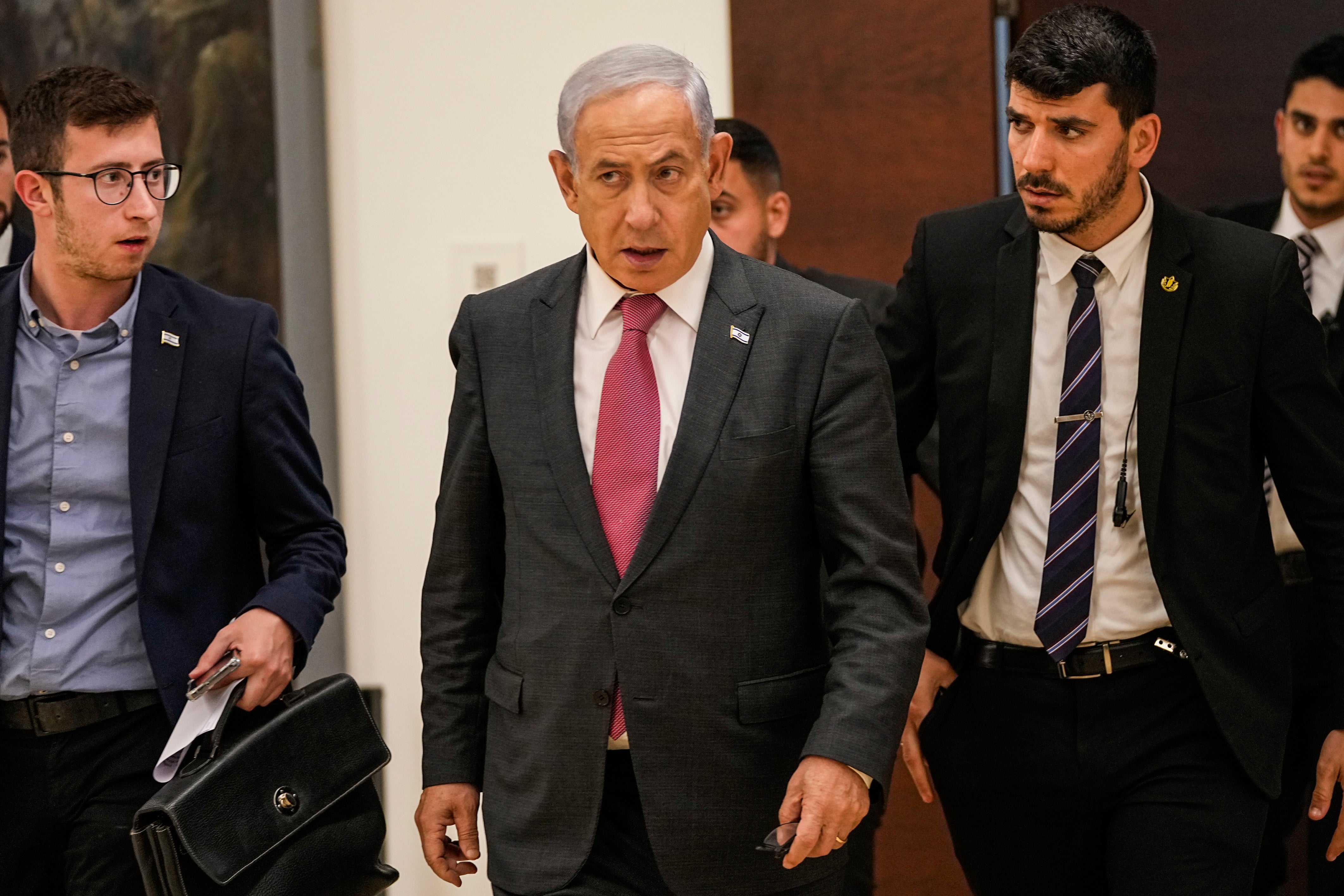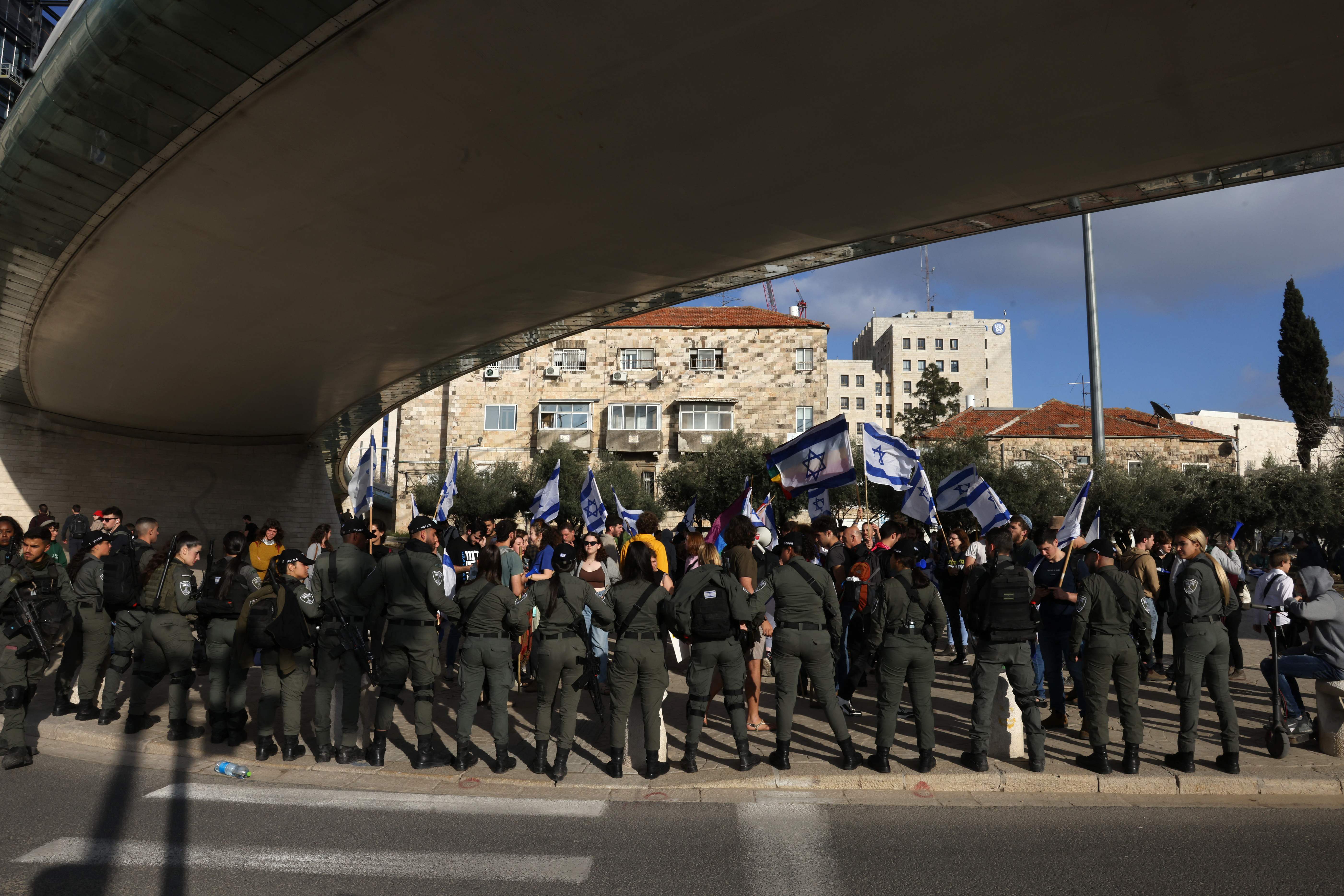
Israel’s prime minister Benjamin Netanyahu has announced a delay to controversial judicial reforms in the wake of mass protests across the country.
“When there’s an opportunity to avoid civil war through dialogue, I, as prime minister, am taking a timeout for dialogue,” Mr Netanyahu said in a nationally televised address. Striking a more conciliatory tone than in previous statements about the plan, he said he was determined to pass legislation to overhaul the judiciary but called for “an attempt to achieve broad consensus”.
Having faced weeks of protest over the reforms, Mr Netanyahu has come under extreme pressure to act in the past 48 hours. Tens of thousands of Israelis demonstrated outside the Knesset (Israel’s parliament) on Monday, while workers launched a nationwide strike aimed at halting the reforms.
Departing flights from the country’s main international airport were grounded in Tel Aviv, and universities shut their doors after Israel’s largest trade union, the Histadrut, called for its 800,000 members to stop work. Diplomats also walked off the job at embassies. In the wake of the announcement by Mr Netanyahu, the strike action – which had threatened to grind the country’s economy to a halt – was called off.
Some protest leaders said demonstrations would continue despite the announcement. Dr Shikma Bressler, one of the main leaders of the movement, said: “The statements of the prime minister and his extremist partners are an admission of their intention to bring the dictatorship laws back to the table in the next parliamentary session, harming the economy and the security of the country.
“As long as the legislation continues and is not shelved, we will be on the streets.”
A pause in the legislation helps ease tensions and buy Mr Netanyahu some time to find a compromise. But there is no guarantee that it will end the crisis. Mr Netanyahu’s coalition is the most right-wing in Israeli history, and hardliners want to push the reforms through.
The security minister Itamar Ben-Gvir – leader of the far-right Jewish Power party, which is part of Mr Netanyahu’s coalition – said in a statement that he had agreed to delay the government’s overhaul of the judiciary in exchange for a promise that a vote on it would take place after the forthcoming parliamentary recess if no agreement was reached in the interim.
Mr Ben-Gvir said the delay would allow time for a compromise agreement to be reached with the political opposition. But he said that if a deal is not reached, the package will be approved in the summer session, which begins on 30 April.
The party also said that Mr Netanyahu had agreed to the formation of a civil “national guard” to be controlled by Mr Ben Gvir, in a move that has worried opposition parties.
If no compromise is reached, with the parties saying they will go into the process with an open mind, Mr Netanyahu still runs the risk of angering his hardline coalition partners such as Mr Ben-Gvir – potentially threatening the stability of his government and risking the possibility of new elections.
The reforms would allow for a simple majority of 61 in the 120-seat Knesset to override almost any Supreme Court ruling, and for politicians to have more say on the justices appointed to the bench.
Critics say the changes would afford the government too much power and erode the rule of law. It has also not been lost on those opposed to the bill that Mr Netanyahu is facing trial on corruption charges (which he denies).
The government has said that judicial reforms are required to prevent overreach by the courts.

Any new election brought about by coalition infighting relating to the reforms would be likely to focus once more on Mr Netanyahu’s suitability to govern while he faces trial.
Protests have been taking place for weeks since the proposals were announced on 4 January, but events at the weekend created a new flashpoint.
On Sunday night, tens of thousands of people burst onto the streets around the country in a spontaneous show of anger at the prime minister’s decision to fire his defence minister for calling for a pause to the overhaul. Chanting “The country is on fire,” people lit bonfires on Tel Aviv’s main highway, causing it to close, along with many others across Israel, for several hours.
Demonstrators gathered again on Monday outside the Knesset, turning the streets surrounding the building and the Supreme Court into a sea of blue-and-white Israeli flags dotted with rainbow Pride banners. Large demonstrations in Tel Aviv, Haifa and other Israeli cities drew thousands more. Opposition to the judicial reforms has sparked some of the largest street protests in Israel’s history.
“This is the last chance to stop this move into a dictatorship,” said Matityahu Sperber, 68, who had joined a stream of people heading to the protest outside the Knesset. “I’m here for the fight to the end.”

Israel’s president, Isaac Herzog, has repeatedly spoken out against the reforms. “For the sake of the unity of the people of Israel, for the sake of responsibility, I call on you to stop the legislative process immediately,” he wrote on Twitter on Monday. Mr Herzog’s position is largely ceremonial, and he is expected to stand above politics. His intervention highlights the unease and division these proposed reforms have caused.
Mr Netanyahu’s announcement that he had decided to dismiss the defence minister, Yoav Gallant, for opposing the plans brought this anger quickly to the surface. A day earlier, Mr Gallant had made a televised appeal for the government to halt the reforms, warning that the deep split that had opened up in Israeli society was affecting the military and threatening national security.

With the army reinforcing units in the occupied West Bank after a year of unrelenting violence that has killed more than 250 Palestinian gunmen and civilians and more than 40 Israelis, the removal of the defence minister fed accusations that the government was sacrificing the national interest for its own.
During chaotic scenes in the Knesset early on Monday, opposition members of parliament attacked Simcha Rothman, the committee chair who has shepherded the bill, with cries of “Shame! Shame!”
“This is a hostile takeover of the state of Israel. No need for Hamas, no need for Hezbollah,” one legislator was heard saying to Mr Rothman as the constitution committee approved a key bill to go forward for ratification. “The law is balanced and good for Israel,” Mr Rothman said.
A no-confidence motion brought forward by opposition parties was also defeated in parliament early on Monday, in a sign that the fight over these reforms is not yet settled – for either side.
Thousands of travellers going through Ben Gurion airport in Tel Aviv faced severe travel disruption after airport staff joined the walkout earlier on Monday.
All departing flights from Israel’s international airport were ordered not to take off, while incoming flights were forced to land at alternative airports. Flightradar24 reported 134 delays and 29 cancelled flights.
“I ordered the immediate halt of take-offs at the airport,” the chair of the Israel Airport Authority workers’ committee, Pinchas Idan, had said.
A flight departing from Abu Dhabi for Tel-Aviv had to make an immediate U-turn on Monday morning. The Etihad flight was told to make its way back while flying over Saudi Arabia.
Reuters and Associated Press contributed to this report







